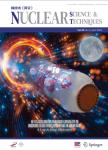Astrophysical constraints on a parametric equation of state for neutron-rich nucleonic matter
Astrophysical constraints on a parametric equation of state for neutron-rich nucleonic matter作者机构:Shandong Provincial Key Laboratory of Optical Astronomy and Solar-Terrestrial Environment School of Space Science and Physics Institute of Space Sciences Shandong University Department of Physics and Astronomy Texas A&M University-Commerce
出 版 物:《Nuclear Science and Techniques》 (核技术(英文))
年 卷 期:2018年第29卷第12期
页 面:62-70页
核心收录:
学科分类:08[工学] 0827[工学-核科学与技术] 082701[工学-核能科学与工程]
基 金:NBZ was supported in part by the China Scholarship Council the U.S.Department of Energy,Office of Science,under Award Number DE-SC0013702,the CUSTIPEN(China-U.S.Theory Institute for Physics with Exotic Nuclei)under the U.S.Department of Energy Grant No.DE-SC0009971 the National Natural Science Foundation of China under Grant No.11320101004
主 题:中子星物质 天体物理学 方程 状态 核子 数据提取 调查结果 模型框架
摘 要:Extracting the equation of state(EOS) and symmetry energy of dense neutron-rich matter from astrophysical observations is a long-standing goal of nuclear astrophysics. To facilitate the realization of this goal, the feasibility of using an explicitly isospin-dependent parametric EOS for neutron star matter was investigated recently in [1–3]. In this contribution, in addition to outlining the model framework and summarizing the most important findings from [1–3], we report a few new results regarding constraining parameters characterizing the highdensity behavior of nuclear symmetry energy. In particular,the constraints on the pressure of neutron star matter extracted from combining the X-ray observations of the neutron star radius, the minimum–maximum mass M=2:01 M_⊙, and causality condition agree very well with those extracted from analyzing the tidal deformability data by the LIGO ? Virgo Collaborations. The limitations of using the radius and/or tidal deformability of neutron stars to constrain the high-density nuclear symmetry energy are discussed.



